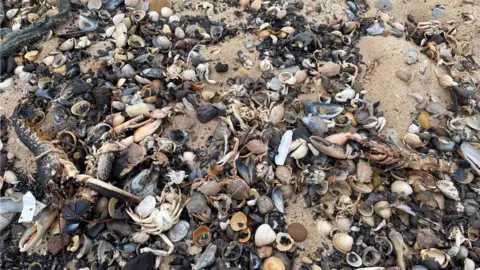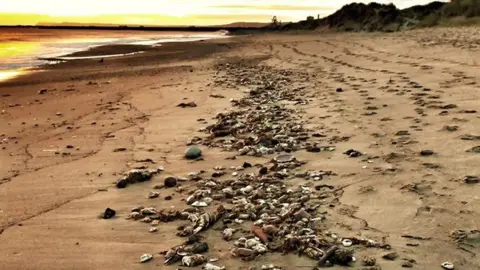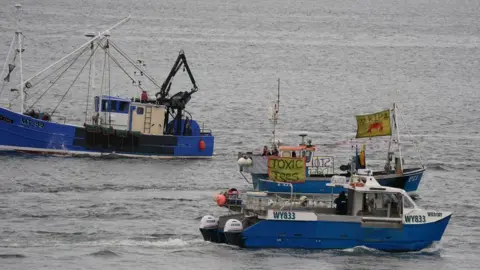RSPB wants urgent probe into crab deaths off north-east coast
 Sally Bunce
Sally BunceA conservation charity wants an "urgent investigation" into the ongoing deaths of thousands of shellfish and other marine life off the North East coast.
The RSPB also called on the government to halt dredging of the Tees estuary until "full scientific analysis" could rule it out as a contributory factor.
Mass wash-ups have happened along the coast since October.
The Department for Environment Food and Rural Affairs (Defra) said findings pointed to "algal bloom" as the cause.
Defra's conclusion has been disputed by the fishing industry with some fearing they would go out of business after experiencing reduced catches.
Fishermen have repeatedly raised concerns about "contaminated sediment" being dredged out of the River Tees and dumped at sea, with more dredging to be done at the new Tees Freeport.
 Paul Grainger /PA Wire
Paul Grainger /PA WireLast month, councils in Redcar and Cleveland, Hartlepool and Middlesbrough called on the government to reinvestigate the cause of the deaths.
The RSPB said it was "deeply concerned" about the mass die-offs and potential effects on the wider marine ecosystem, including seabirds, and strongly recommended Defra take action.
"We understand that the first event, which occurred in October 2021, was investigated by Defra who found the crabs and lobsters contained exceptionally high levels of pyridine, an industrial pollutant, alongside a number of known algal toxins," said Blanaid Denman, senior conservation officer.
"As the source and impact of the pyridine was unclear, the investigation concluded in November that a rare toxic algal bloom was the most likely cause and the investigation was formally closed in March 2022."
The charity said that while algal bloom may have been a factor in October, the die-offs had continued throughout the past nine months, which "clearly indicates" another underlying cause, which required "urgent investigation".
 PA Media
PA Media'Most likely cause'
Defra's investigation found it was unlikely chemical pollution, sewage or infectious aquatic animal diseases were to blame.
A review of dredging activity and water samples found no evidence of a link between the disposal of dredged sediment and the deaths, and the investigation was closed because Defra said healthy crabs and lobsters were being found.
"Defra led a comprehensive investigation into the cause of dead crabs and lobsters that washed up on the North East coast between October and December last year," a spokesperson said.
"Government scientists carried out extensive testing for chemicals and other pollutants, including pyridine, but concluded a naturally occurring algal bloom was the most likely cause.
The department added that it was "a complex area of research" and it would continue to work with universities and other experts "to understand it better."
Teesport owner PD Ports has previously said it was "required by law" to regularly dredge the river and the work was done "in compliance with strict environmental regulations".
The firm said it shared concerns about the deaths and impact on the "livelihoods of thousands of people working in all industries that depend on the river".

Follow BBC North East & Cumbria on Twitter, Facebook and Instagram. Send your story ideas to [email protected].
